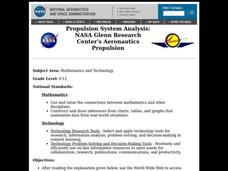Teach Engineering
Equal and Opposite Thrust in Aircraft: You're a Pushover!
It's the law—every action requires a reaction, no matter how small. Pupils experience two demonstrations of Newton's third law of motion as it relates to thrust in the 10th segment of a 22-part unit on flight. Using their mathematical...
Teach Engineering
May the Force Be With You: Thrust
Force the plane through the air. The instructional activity introduces the force on an airplane that makes it go forward. Pupils learn how Newton's laws of motion apply to flight in the eighth segment of a 22-part unit on flight.
Kenan Fellows
Weight and Balance of an Airplane
A career in aeronautics might be calling your class members. Building from the previous two lessons in the series, learners continue analyzing the mathematics of aeronautics. Groups create a paper airplane using paperclips for balance....
Kenan Fellows
Reading Airline Maintenance Graphs
Airline mechanics must be precise, or the consequences could be deadly. Their target ranges alter with changes in temperature and pressure. When preparing an airplane for flight, you must read a maintenance graph. The second lesson of...
Kenan Fellows
Introduction to a Flight Computer
Keep your hands on the wheel—at all times! Scholars learn why pilots use a flight computer through a high-flying demonstration. Making calculations for speed, distance, or time is automatic if you know how to use a flight computer.
Curated OER
Density
Students, in groups, design a procedure to calculate the mass of gas molecules in the classroom by measuring the volume of the classroom and researching the density of air. They apply changes in air density with altitude and effects on a...
Curated OER
Aeronautics Propulsion
Students use the World Wide Web to access additional information needed to complete the activities on the forces on an airplane, the function of the stabilizer, and the calculation of Mach speed, temperature, pressure, and thrust.
Curated OER
Using 3-D Models for Code Validation with FoilSim
High schoolers use FoilSim to complete the activity to create tables of data sets comparing the lift values for a 3-D model of a symmetrical wing section to the values predicted by the FoilSim software.
Teach Engineering
Magical Motion
Make solutions to projectile motion problems magically appear using equations. Pupils watch a clip from a Harry Potter movie and find the length of time it takes for a remembrall to fall into Harry's hands. They use a projectile motion...








